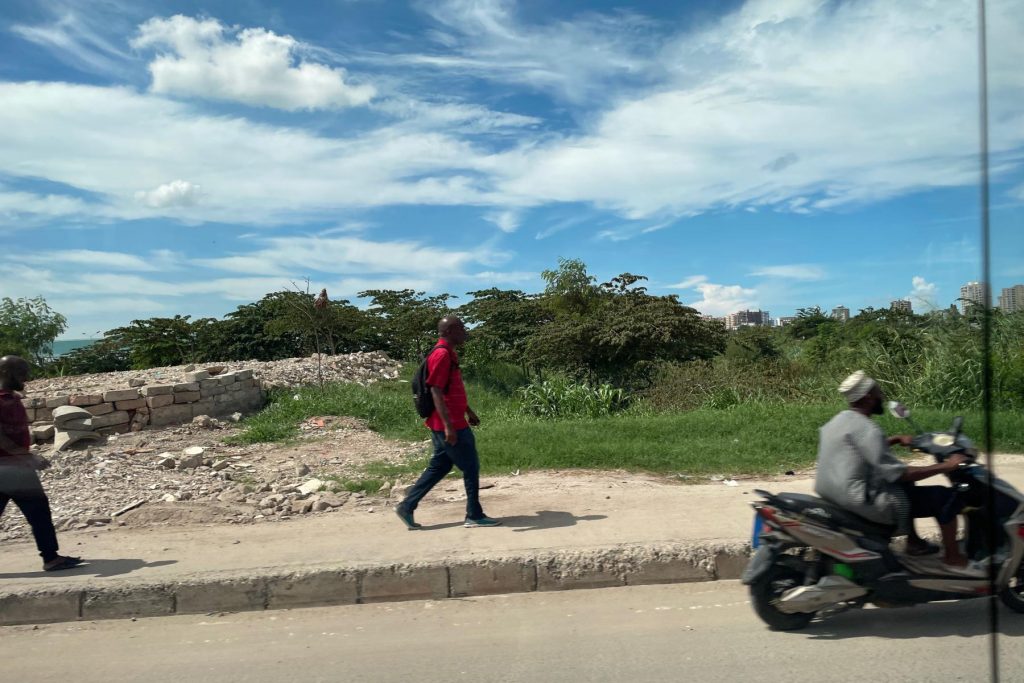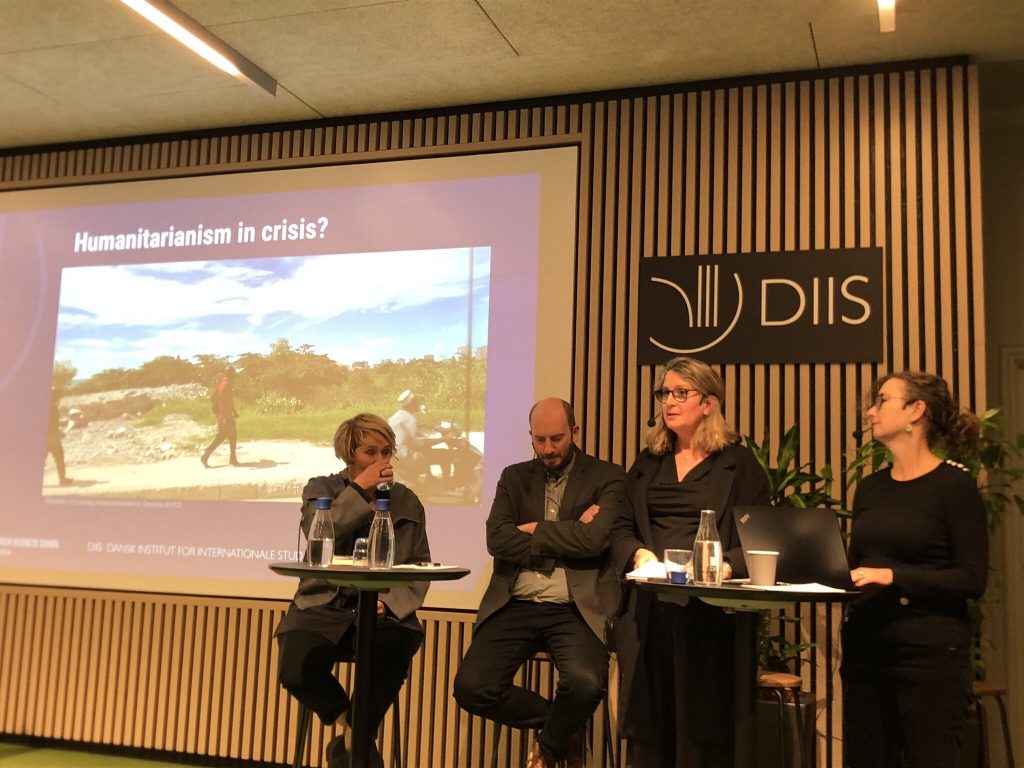By Alexander Maxelon, Nauja Kleist and Lisa Ann Richey.

Humanitarianism is undergoing a profound transformation, with an array of diverse actors entering the humanitarian arena. These shifts raise critical questions about the efficacy of humanitarian responses and the evolving needs of those who rely on them.
The emergence of climate change, protracted conflicts, and political upheavals have not only challenged traditional approaches to aid delivery but also prompted humanitarian organizations to consider proactive measures, aiming to anticipate future needs rather than solely react to emergencies. Moreover, the entry of diverse actors from civil society and the corporate sector into the humanitarian arena has blurred the lines of what constitutes humanitarianism. What are the implications?
A recent seminar titled “Humanitarianism in Crisis?” provided a platform to delve into these pressing issues. Hosted by Ida Marie Savio Vammen, DIIS, and Lisa Ann Richey, CBS, the event brought together leading scholars to explore the complexities facing humanitarianism today. Among them were Polly Pallister-Wilkins, University of Amsterdam, Antonio de Lauri, Chr. Michelsen Institute, and Nauja Kleist, DIIS. Central to the discussion was the inquiry into whether humanitarianism faces a crisis of legitimacy and, if so, what implications this holds for the future of humanitarian action.

Three Distinct Temporalities of Humanitarianism
De Lauri posited that deriving a common understanding of humanitarianism is paramount to evaluating its challenges. Therefore, he delineated three temporalities of humanitarianism: improvisation, institutionalization, and absence. Improvisation epitomizes the grassroots efforts witnessed in Lampedusa, where volunteers mobilized to aid stranded migrants, challenging conventional aid paradigms with their mostly symbolic impacts. In contrast, institutionalization manifests in the formalization of aid mechanisms within established structures, as seen by humanitarian responses in the Kurdistan region. Finally, the abrupt absence of humanitarian aid, exemplified by the withdrawal of support following the Taliban’s resurgence in Afghanistan, underscores the fragility of aid networks and the vulnerability of aid-dependent communities.
Humanitarianism Beyond Traditional Boundaries
While de Lauri approached humanitarianism from a temporal perspective, Richey adopted an actor-centric approach, shedding light on a notable shift towards Global South involvement in what is considered “humanitarianism”. This evolving landscape includes everyday humanitarianism, a distinct form of humanitarianism where formalization is not a prerequisite for aid activities. Richey’s research project “Everyday Humanitarianism in Tanzania” (EHTZ), conducted in collaboration with an interdisciplinary group of scholars from Denmark, the UK, and Tanzania, delves into the dynamics of this giving type. Their findings reveal that local everyday givers exhibit similar behavior to foreign institutionalized givers, with both groups demonstrating reactive giving practices and a commitment to maximizing aid effectiveness by rigorously assessing receivers.
Kleist’s current research analyses the engagement of Somali diaspora actors in Europe and East Africa, under the auspices of the “Diaspora Humanitarianism in Complex Crises” (DHUM) research project, carried out in collaboration with colleagues in Nairobi and Hargeisa. Highlighting the embeddedness of giving within social relationships, Kleist explained that Somali diaspora givers are guided by social embeddedness, with mobilization and accountability mechanisms embedded in mechanisms of trust and social control, rather than bureaucratic procedures. Yet, contrasting with the Tanzanian case, her research also unveils instances of diaspora humanitarianism without pre-existing relationships.
Contemporary and Future Challenges of Humanitarianism
Kleist further asked the other speakers to reflect on the implications of the humanitarian terminology. As Richey underscored, labelling a situation as humanitarian endows it with significant power, often legitimizing external intervention. For example, De Lauri explained how EU coast guard operations in international waters of the Mediterranean Sea are justified under the guise of addressing humanitarian crises, allowing for interventions that might otherwise be contentious. This legitimization also makes humanitarian efforts appealing to businesses, prompting a critical examination of who ultimately benefits the most from such interventions – the helpers or those being helped.
Pallister-Wilkins echoed concerns about a crisis within humanitarianism, highlighting two significant challenges facing the sector. Firstly, climate change emerges as an existential threat, necessitating a reevaluation of humanitarian norms and practices. Pallister-Wilkins emphasized the imperative of global-scale responses to climate-related crises, challenging the prevailing focus on localized interventions. Secondly, the rise of authoritarian regimes and far-right populism poses a direct threat to humanitarian principles. Attacks on marginalized communities based on xenophobia, racism, and homophobia undermine the universality of human rights, thereby eroding the foundations of humanitarian action.
Navigating the Path Forward
As humanitarianism confronts existential challenges, it simultaneously presents opportunities for transformation, adaptation and solidarity. One such avenue for exploration involves embracing proactive approaches that extend beyond mere reactions to emergencies. By endeavoring to predict and prepare for future needs, humanitarian efforts can potentially gain an edge over other interventions while addressing concerns regarding their legitimacy. Moreover, recognizing the efforts that local communities play in aid endeavors, as seen by everyday humanitarianism in Tanzania and Somali diaspora humanitarianism, offers a promising avenue for reflection, with the potential to mitigate the lingering colonial undertones that pervade the industry.
Alexander Maxelon, student assistant, Department of Management, Society and Communication at Copenhagen Business School
Nauja Kleist, senior researcher, Danish Institute for International Studies
Lisa Ann Richey, Professor of Globalization, Department of Management, Society and Communication, Copenhagen Business School
